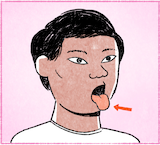
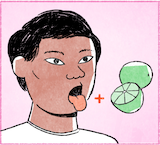
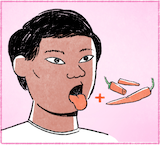
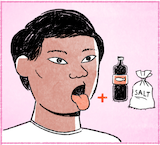
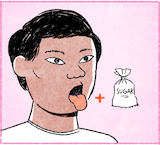
อันนี้เขาเป็นพุหญิงหลือเป็นพุซาย เขาเป็นพุซาย
คือฮู้ว่าเขาเป็นพุซาย กะฮู้ว่าเขาเป็นพุซาย ผมเขาสั้น หน้าตาเขาคือพุซาย กะเลยคิดว่าเป็นพุซาย
หน้าตาเขาบ่คือพุหญิง กะเลยบ่คิดว่าเขาเป็นพุหญิง
ลูกสอนซี้ไปใส่ลิ้นของเขา เป็นหญังลูกสอนคือซี้ไปใส่ลิ้นของเขา อันนี้กะบ่ฮู้คือกัน เขาอาดสิอยากให้เฮาฮู้ว่าเขากำลังเป็นหญัง เขากำลังเฮ็ดหญังอยู่ เขากะเลยซี้ลูกสอนไปใส่ลิ้นของเขา
ลิ้นอันนี้มีหน้าที่เฮ็ดหญัง ลิ้นอันนี้เอาไว้เฮ็ดหญัง ลิ้นอันนี้เอาไว้ถ้าซิม หลือเอาไว้ถ้ากิน หลือเอาไว้ถ้าฮู้ว่าสิ่งของที่เฮากินไปนั้น มีลดซาดเผ็ด หลือหวาน หลือเค็ม หลือจืด
ขั้นเฮาบ่มีลิ้น เฮากะบ่สามาดฮู้ลดซาดของแนวกินได้
ลิ้นอันนี้มีสีอี่หยัง ลิ้นอันนี้กะมีสีแดง บางคนกะมีลิ้นสีซมพู
ตอนนี้เขาเฮ็ดอี่หยังอยู่ ตอนนี้เขากำลังแลบลิ้นอยู่ เขากำลังแลบลิ้นออกมาข้างนอก บ่ฮู้ว่าเขาเป็นหญัง เขาอาดสิเผ็ด หลืออาดสิเค็ม หลืออาดสิส้มอี่หยังบางสิ่งบางอย่างกะได้
2
อันนี้คืออี่หยัง อันนี้คือบักนาว อันนี้เป็นบักนาว
บักนาวเป็นลูกจั่งใด บักนาวเป็นแบบใด บักนาวเป็นน่วยสีเขียว น่วยน้อยๆ น่วยบ่ใหญ่หลาย
บักนาวสิเอาไว้ถ้าเฮ็ดแนวกิน หลือเอาไว้ถ้าเฮ็ดน้ำอี่หยังบางสิ่งบางอย่างกะได้
บักนาวนี้เป็นเคี่ยงปุง เอาไว้ถ้าปุงแนวกิน
ในน่วยของบักนาวหนะสิมีน้ำ น้ำเอาไว้ถ้าเฮ็ดเคี่ยงปุง หลือเอาไว้ถ้าปุงแนวกิน
น้ำบักนาวสิมีลดซาดจั่งใด น้ำบักนาวสิมีลดซาดส้ม ลดซาดเปี้ยว ส้มคัก บางน่วยกะส้มหลาย บางน่วยกะส้มหน้อย แล้วแต่บักนาว
ขั้นบักนาวแก่ หลือบักนาวน่วยแก่ๆ แล้ว กะสิมีลดซาดส้มหลาย ขั้นบักนาวอ่อน หลือบักนาวบ่ทันได้แก่หลาย กะสิมีลดซาดส้มบ่หลาย
คนส่วนหลายสิมักลดซาดส้มนี้บ่ บ่ กะมีส่วนหน้อย บ่ได้มีส่วนหลาย คนส่วนหน้อยที่สิมักกินส้มแบบนี้ คนส่วนหน้อยที่มักกินลดซาดส้มๆ
เพาะว่ากินส้มหลายมันกะบ่ดี เพาะว่าขั้นกินส้มหลายๆ มันสิเฮ็ดให้กะเพาะเฮาบ่ดี หลือลำไส้เฮาบ่ดี หลืออะวัยยะวะต่างๆ ของเฮาในล้างกายของเฮานี้บ่ดี
บักนาวนี้มันเป็นกด เป็นกดบางสิ่งบางอย่าง ขั้นกินคักๆ กินหลายๆ มันกะบ่ดีต่อสุกขะพาบหลือล้างกายของเฮา
3
นี้คืออี่หยัง นี้คือบักพิก อันนี้เป็นบักพิก
บักพิกเป็นอี่หยัง บักพิกเป็นพืด เอาไว้ถ้าเฮ็ดแนวกิน เอาไว้ถ้าปุงแนวกินคือกัน
บักพิกมีลดซาดเผ็ดบ่ กะเผ็ดอยู่ เผ็ดบักหลาย เผ็ดคัก เผ็ดคักอี่หลี
ขั้นพุใดอยากเฮ็ดแนวกิน หลือเฮ็ดกับเข้านั้นหละ ขั้นอยากมีลดซาดเผ็ด ขั้นอยากให้แนวกินมีลดซาดเผ็ด หลือลดซาดเผ็ดคักๆ กะใส่บักพิก ใส่บักพิกนี้ลงไป เอาไว้ถ้าปุงแนวกิน เอาไว้ถ้าปุงกับเข้า แล้วลดซาดนั้นกะสิมีลดซาดเผ็ดขึ้นมาทันที
คนส่วนหลายสิมักกินบักพิกบ่ กะแล้วแต่คน เพาะว่าบักพิกนี้เอากินเหล้นบ่ได้ บักพิกเอาไว้ถ้าปุงแนวกิน เอาไว้ถ้าปุงกับเข้า เอาไว้ถ้าใส่เฮ็ดแนวกินซื่อๆ บ่สามาดกินเหล้นได้ บ่สามาดกินได้คือหมากไม้หลือผนละไม้ได้
4
นี้คืออี่หยัง นี้คือเกีย อันนี้คือเกีย แล้วกะมีน้ำปาพ้อม
อันนี้เป็นน้ำปากับเกีย
เกียเป็นแบบใด แล้วน้ำปาเป็นแบบใด เกียมันกะเป็นผง เป็นผง เป็นก้อนน้อยๆ เป็นก้อนบ่ใหญ่ มันบ่ได้เป็นน้ำ
แต่ว่าน้ำปามันสิเป็นน้ำ มันสิเป็นน้ำคือน้ำนี้หละ แต่ว่าเป็นน้ำดำๆ
แต่ว่าเกียกับน้ำปานี้ สิมีลดซาดเค็มคือกัน มีลดซาดเค็มคือกัน เค็มบักคัก เกียกับน้ำปานี้สิเค็มอี่หลี เค็มคัก เค็มคักกะด้อกะเดี้ย
คนส่วนหลายสิมักกินลดซาดเค็มนี้บ่ บ่ คนส่วนหลายนี้สิบ่มักกินเค็ม กินเค็มหลายกะบ่ดี กินเค็มหลายๆ กะบ่ดีต่อสุกขะพาบ
แต่ว่าคนกะมักกิน แต่ว่าหมอแนะนำบ่ให้กินเค็มหลาย ขั้นกินเค็มหลายกะบ่ดี มันสิเฮ็ดให้เป็นโลกไต หลือเสียสุกขะพาบนั้นหละ
5
นี้คืออี่หยัง นี้คือน้ำตาน อันนี้เป็นน้ำตาน เป็นน้ำตานเอาไว้ถ้าเฮ็ดแนวกิน หลือเอาไว้ถ้าเฮ็ดหวาน หลือเอาไว้ถ้าเฮ็ดน้ำ เฮ็ดอี่หยังกะได้ ที่เกี่ยวกับลดซาดหวานๆ
น้ำตานมีลักสะนะเป็นผง เป็นก้อนน้อยๆ ก้อนน้อยๆ ก้อนบ่ใหญ่หลาย ก้อนส่ำๆ กันกับเกียนั้นหละ แต่ว่าเป็นคนละแบบ
น้ำตานสิมีลดซาดหวาน หวานคัก หวานคักอี่หลี หวานกะด้อกะเดี้ย
คนส่วนหลายสิมักกินน้ำตานนี้ สิมักเอาน้ำตานไปเฮ็ดปุงเป็นอาหาน หลือปุงไปเป็นน้ำปั่น ปุงน้ำเชื้อม ปุงอี่หยังกะได้ ที่เกี่ยวกับน้ำตาน คนส่วนมากสิกินหวาน กินน้ำตาน
แต่ว่ากินหลายๆ กะบ่ดี มันบ่ดีต่อสุกขะพาบ สิเฮ็ดให้เป็นโลกเบาหวานได้
Link to overview page
Link to dictionary
| Isaan | Pronunciation | Tones | Thai | English/Notes |
|---|---|---|---|---|
| อัน | an | M | อัน | 1. thing, object 2. general clf. for objects |
| นี้ | ni: | HF | นี้ | 1. this 2. here |
| เขา | khao | M | เขา | personal pronoun: he, she |
| เป็น | pen | M | เป็น | 1. to be, to exist 2. to be able to 3. to suffer, sth. happens to 4. เป็นหญัง[...]คือ in initial position: why? {เป็นหญังเขากะคือแปงฟัน = Why is he brushing his teeth?} {เป็นหญังเคี่ยงบินมันคือสิตก = Why is the airplane falling down?} |
| พุหญิง | phu-ɲiŋ | H-M | ผู้หญิง | woman, female |
| หลือ | lʉ: | M | หรือ | or |
| พุซาย | phu-sa:i | H-HR | ผู้ชาย | man, male |
| คือ | khʉ: | HR | คือ | 1. to be, to resemble, like, as 2. why {บักหล้าคือบ่เก็บโต่ะแน่ = [addressing a young boy] Why haven't you cleared the table?} |
| ฮู้ | hu: | HF | รู้ | 1. to know 2. to understand Notes: equivalent to ลู้ |
| ว่า | wa: | H | ว่า | 1. that, as {คำว่า X = the word X} 2. to say |
| กะ | ga | M | ก็ | 1. then, consequently 2. also |
| ผม | phom | M | ผม | hair |
| สั้น | san | LF | สั้น | short |
| หน้าตา | na:-ta: | LF-M | หน้าตา | face |
| เลย | lə:i | HR | เลย | 1. futher on, beyond, past {เข็มน้อยเลยเลขสิบสองไป = the minute hand has passed number twelve} 2. too much 3. at all 4. definitively 5. completely, utterly |
| คิด | khit | H | คิด | 1. to think 2. to calculate {คิดเงิน = to calculate the price} |
| บ่ | bɔ: | H | ไม่ | 1. no, not 2. question particle, transforming a statement into a question Notes: spelling exception in line with common usage on social media |
| ลูกสอน | lu:k-sɔ:n | HF-M | ลูกศร | arrow |
| ซี้ | si: | HF | ชี้ | to point, to indicate, to show |
| ไป | pai | M | ไป | 1. to go 2. auxiliary indicating action extending into the future |
| ใส่ | sai | H | ใส่ | 1. to put something in/on {เขาใส่บักพิกในกวยเตียวหลาย = he's putting a lot of chili in his noodle soup} {เขาบีบยาสีฟันใส่แปงสีฟัน = he squeezes toothpaste on the toothbrush} {ก่องเอาไว้ใส่ของ = boxes are there to put stuff in} 2. to wear (clothes) {เขาใส่เสี้ยแขนญาว = he's wearing a long-sleeve} 3. directed at {เอิ้นใส่กัน = to call each other/to say to each other} {หมามันเห่าใส่แมว = the dog barks at the cat} {ล้องเพงใส่ไม = to sing into the microphone} {เขากำลังซี้มือไปใส่พุซาย = she's pointing at the man} |
| ลิ้น | lin | HF | ลิ้น | tongue |
| ของ | khɔ:ŋ | M | ของ | of, belonging to |
| หญัง | ɲaŋ | M | อะไร, เป็นหญัง = ทำไม | 1. what {เขากำลังเฮ็ดหญัง = What is he doing?} {ธูปเอาไว้เฮ็ดหญัง = What are incense sticks for?} 2. something, anything, (nothing) 3. เป็นหญัง[...]คือ in initial position: why {เป็นหญังเขาคือใส่บักพิกลงไปในกวยเตียว = Why is he putting chili in [his] noodle soup?} {เป็นหญังหน้าต่างมันคือเปิด = Why is the window open?} {เป็นหญังมันคือมีควนไฟ = Why is there smoke?} |
| คือกัน | khʉ:-gan | HR-M | เหมือนกัน | 1. also, likewise, similarly {ยินดีที่ได้ฮู้จักคือกันคับ = Nice to meet you too!} 2. in negative sentences: either {บ่ลู้คือกัน = I don't know either} {จักคือกัน = I don't know (either)} |
| อาด | a:t | LF | อาจ | 1. might, may, will 2. likely |
| สิ | si | M | จะ | future tense auxiliary {เขากำลังสิตื่น = he's about to wake up} {สิไปตะหลาด = [I'm] going to the market} |
| อยาก | ya:k | LF | อยาก | to want, to wish |
| ให้ | hai | LF | ให้ | 1. to give {หมอกำลังเอายาให้คนป่วยกิน = the doctor is giving the patient medicine} 2. for 3. to allow, to be allowed |
| เฮา | hao | HR | เรา | 1. personal pronoun: we 2. personal pronoun: I |
| กำลัง | gam-laŋ | M-HR | กำลัง | auxiliary indicating continuous or progressive action |
| เฮ็ด | het | H | ทำ | to do, to make |
| อยู่ | yu: | H | อยู่ | 1. to be (located) at 2. yet, still 3. auxiliary indicating continuous or progressive action {ทอดปาอยู่ในกะทะ = (in the process of) frying a fish in the pan} {แม่กำลังเมี้ยนเฮียนอยู่ = mother is cleaning/tidying up the house} |
| มี | mi: | HR | มี | 1. to have 2. there is |
| หน้าที่ | na:-thi: | LF-H | หน้าที่ | duty, responsibility, obligation, function |
| เอา | ao | M | เอา | to take, to give {เขากำลังเอาก่องไปซั่ง = he's taking the boxes to weigh them} {หมอกำลังเอายาให้คนป่วยกิน = the doctor is giving medicine to the patient} {เอาไว้ถ้า = is for, is used for, has the purpose of} |
| ไว้ | wai | HF | ไว้ | 1. to keep, to put, to place, to retain, to save, to reserve {เขาเอาหัวของเขาไว้ใส = Where does she put her head?} {หมาสิเลี้ยงไว้บ้าน = dogs are kept/raised in the house} {ไก่เลี้ยงไว้ในคอก = chicken are kept/raised in a coop} {หน้ามันบังไว้ = the face is covered/not visible} {เขาเอาโทละสับวางไว้หู = he holds the phone to his ear} 2. for {นาลิกาปุกมีไว้เฮ็ดหญัง = What is an alarm clock for?} {หม้อเอาไว้เฮ็ดแนวกิน = a pot is used to make food} {ก่องเอาไว้เฮ็ดหญัง ก่องเอาไว้ใส่ของ = What is the box for? It's for putting in stuff.} Notes: see also ไว้ถ้า |
| ไว้ถ้า | wai-tha: | HF-LF | usually in a positive statement or answer: is for, is used for, has the purpose of {กะทะมีไว้ถ้าทอด = a pan is for frying} {น้ำบักนาวมีไว้ถ้าปุงอาหาน = lime juice is used to season food} {ปากกามีไว้ถ้าเขียน = a pen is for writing} {กะเทียมเอาไว้ถ้าเฮ็ดแนวกิน = garlic is used to make food} {ขาเอาไว้ถ้าญ่าง = legs are for walking} {เกิบเอาไว้ถ้าใส่ = shoes are for wearing} Notes: see also ไว้ |
|
| ซิม | sim | HR | ชิม | to taste, to try |
| กิน | gin | M | กิน | to eat, to consume, to use |
| สิ่งของ | siŋ-khɔ:ŋ | H-M | สิ่งของ | thing, object |
| ที่ | thi: | H | ที่ | 1. that, which {คนที่ยืนอยู่ฝั่งขวา = the person which is standing on the right = the person standing on the right} {เว้าคำที่บ่สุพาบ = to speak words which are impolite = to speak impolitely} 2. for ordinal numbers {ที่สาม = third} |
| นั้น | nan | HF | นั้น | that, there |
| ลดซาด | lot-sa:t | H-HF | รสชาติ | taste Notes: pronunciation: also realized as ลดชาด |
| เผ็ด | phet | M | เผ็ด | spicy, hot |
| หวาน | wa:n | M | หวาน | sweet |
| เค็ม | khem | HR | เค็ม | salty |
| จืด | jʉ:t | LF | จืด | tasteless, not spicy |
| ขั้น | khan | LF | เมื่อ | when, if |
| สามาด | sa:-ma:t | M-HF | สามารถ | can, to be able |
| แนวกิน | nɛ:o-gin | HR-M | อาหาร | food {เฮ็ดแนวกิน = to prepare food} {ตำบักหุ่งเนี้ยกะสิเป็นแนวกิน = papaya salad is (a kind of) food} |
| ได้ | dai | HF | ได้ | 1. can 2. to get, to obtain 3. before verb: indicating past tense 4. บ่ได้ + verb: not |
| สี | si: | M | สี | 1. color 2. colored pencil, crayon |
| อี่หยัง | i:-yaŋ | H-M | อะไร | 1. what {นี้คืออี่หยัง = What is this?} {มื้อนี้เจ้าเฮ็ดอี่หยัง = What are you doing today?} {กินเข้างายกับอี่หยัง = What did you have for breakfast?} 2. something, anything, (in negations) nothing {บ่ต้องเฮ็ดอี่หยังอีกเลยนอกจากใส่ปุย = [we] don't need to do anything besides adding fertilizer} |
| แดง | dɛ:ŋ | M | แดง | red |
| บาง | ba:ŋ | M | บาง | 1. some {สัดบางโตบ่มีขา = some animals don't have legs} {บางคนสิมักกินกวยเตียวแทนเข้า = some people like to eat noodle soup instead of rice (dishes)} {บางสิ่งบางอย่าง = something, anything} 2. thin |
| คน | khon | HR | คน | person, people |
| ซมพู | som-phu: | HR-HR | ชมพู | pink |
| ตอนนี้ | tɔ:n-ni: | M-HF | ตอนนี้ | now |
| แลบลิ้น | lɛ:p-lin | HF-HF | แลบลิ้น | to stick out one's tongue |
| ออก | ɔ:k | LF | ออก | 1. to go out, to leave 2. out |
| มา | ma: | HR | มา | 1. to come 2. auxiliary expressing action towards the present or focal time {กะคุเฮ็ดมาจากอี่หยัง = What is the bucket made of?} {แล้วเขากะเก็บเงินจากพุนั้นมา = and then she takes the money of that person} |
| ข้างนอก | kha:ŋ-nɔ:k | LF-HF | ข้างนอก | outside |
| ส้ม | som | LF | เปรี้ยว | sour {บักนาวมันส้มบักคักหนึ่ง = lime fruits are really sour} |
| บางสิ่งบางอย่าง | ba:ŋ-siŋ-ba:ŋ-ya:ŋ | M-H-M-H | บางสิ่งบางอย่าง | something, anything |
| บักนาว | bak-na:o | M-HR | มะนาว | lemon, lime |
| ลูก | lu:k | HF | ลูก | 1. child 2. clf. for balls, fruits (lime), mountains |
| จั่งใด | jaŋ-dai | H-M | ยังไง, แบบไหน | how, in what manner {บักนาวมันมีลดซาดจั่งใด = Lime fruits have what kind of taste?} {เขาปิดแอจั่งใด = How is he switching off the A/C?} {เทียนใซ้จั่งใด = How's a candle used?} {สิใซ้จั่งใด = how is [it] used?} |
| แบบ | bɛ:p | LF | แบบ | 1. example, model, kind 2. style, form, pattern, design |
| ใด | dai | M | ใด | 1. which, that one which, what, how {เขานั่งแบบใด เขานั่งขดตะหมาดอยู่ = How is he sitting? He's sitting cross-legged.} {ตอนใด = when?} 2. whichever, whoever {หม้องใดหม้องหนึ่ง = some place, somewhere} {ขั้นเฮาอยากตื่นญามใด เฮากะตั้งเวลาปุกญามนั้น = If we want to get up at a certain time, we set the alarm to that time} Notes: sentence-final often with a marked rising tone |
| น่วย | nu:ai | H | ลูก, ผล | clf. for the fruits (e.g., banana, coconut, lime, papaya, watermelon), vegetables (e.g., chilis), eggs, mountains, the sun |
| เขียว | khi:ao | M | เขียว | green |
| น้อย | nɔ:i | HF | น้อย | 1. few, little 2. small |
| ใหญ่ | ɲai | H | ใหญ่ | large, big |
| หลาย | la:i | M | เยอะ, มาก | many, much, very |
| น้ำ | na:m | HF | น้ำ | 1. water 2. drink, soft drink, juice |
| เคี่ยงปุง | khi:aŋ-puŋ | H-M | เครื่องปรุง | seasoning, flavouring |
| ปุง | puŋ | M | ปรุง | to season, to flavor, to cook, to mix, to combine {ปุงกาแฟ = to season coffee, i.e., to add sugar} {ปุงกวยเตียว = to season noodle soup (e.g., with chili, fish sauce, vinegar, sugar etc.)} |
| ใน | nai | HR | ใน | in, within |
| หนะ | na | M | final particle | |
| เปี้ยว | pi:ao | HF | เปรี้ยว | sour |
| คัก | khak | H | intensifier: very, very much | |
| หน้อย | nɔ:i | LF | น้อย | 1. a little/some 2. not long |
| แล้วแต่ | lɛ:o-tɛ: | HF-H | แล้วแต่ | up to, depending on |
| แก่ | gɛ: | H | แก่ | 1. old 2. dark |
| แล้ว | lɛ:o | HF | แล้ว | 1. finished 2. already 3. and then, and next (especially แล้วกะ) 4. auxiliary for past tense |
| อ่อน | ɔ:n | H | อ่อน | 1. soft 2. young |
| บ่ทันได้ | bɔ:-than-dai | H-HR-HF | ยังไม่ได้ | not, not yet {บ่ทันได้กินเข้า = [I] haven't eaten yet} {อายุบ่ทันได้หลาย = not yet old} {เขาอาดสิบ่ทันได้เถ้ากะได้ = maybe he's not yet (that) old} Notes: see also ทันได้ which is apparently equivalent |
| ส่วนหลาย | su:an-la:i | H-M | ส่วนมาก | 1. mostly, mainly 2. many, a majority (of people) |
| มัก | mak | H | ชอบ | to like, to love, to want, to desire |
| ส่วนหน้อย | su:an-nɔ:i | H-LF | ส่วนน้อย | a few, a minority (of people) |
| เพาะว่า | phɔ-wa: | H-H | เพราะว่า | because |
| มัน | man | HR | มัน | it (also used to refer to people) |
| ดี | di: | M | ดี | good |
| กะเพาะ | ga-phɔ | M-H | กระเพาะ | stomach |
| ลำไส้ | lam-sai | HR-LF | ลำไส้ | intestine |
| อะวัยยะวะ | a-wai-ya-wa | M-HR-M-H | อวัยวะ | organ, body part |
| ต่างๆ | ta:ŋ-ta:ŋ | H-H | ต่างๆ | different, various |
| ล้างกาย | la:ŋ-ga:i | HF-M | ร่างกาย | body |
| กด | got | M | กรด | 1. acid 2. acidic |
| ต่อ | tɔ: | H | ต่อ | 1. next 2. to join, to connect, to link Notes: see also ต่อไป, ต่อไปนี้ |
| สุกขะพาบ | suk-kha-pha:p | M-M-HF | สุขภาพ | health |
| บักพิก | bak-phik | M-H | พริก | chili |
| พืด | phʉ:t | HF | พืด | plant |
| บัก | bak | M | 1. intensifier before adjectives {ปาโตบักใหญ่ = a (very) large fish} 2. prefix in front of fruits and vegetables {บักแตงโม = watermelon} 3. can be used as a reference for a male person of the same or younger age {บักอันนี้ = this lad} |
|
| อี่หลี | i:-li: | H-M | จริง | intensifier: really Notes: pronunciation: also realized as อี่หลิ |
| พุใด | phu-dai | H-M | ใคร | 1. who {มีพุใดโทมากะบ่ลู้ = I don't know who has called} {ห้องนอนของพุใด = whose bedroom (is this)? } 2. someone, somebody, anybody, in negative context: nobody {บ่มีพุใดอยู่กับเขาเลย = there's nobody with him} |
| กับ | gap | M | กับ | 1. and {ลุงกับป้า = uncle and aunt} {กวยเตียวหมูกับกวยเตียวไก่ = noodle soup with pork and noodle soup with chicken} 2. with, to {ค้ายๆ กับคำว่า ... = similar to the word ...} 3. prefix in front of foods {กับเข้า = side dishes eaten with rice} {เขากินกับกวยเตียว = he's eating noodle soup} |
| เข้า | khao | LF | ข้าว | rice {กินเข้า = to eat} {ปูกเข้า, เฮ็ดเข้า = to grow/plant rice} {เกี่ยวเข้า = to harvest rice} {กับเข้า = courses eaten with rice} |
| นั้นหละ | nan-la | HF-M | นั่นแหละ | auxiliary for emphasis at the end of a phrase |
| ลง | loŋ | HR | ลง | 1. to descend, to lower, to go down 2. down 3. bus/train etc.: to get off, to disembark {คนกำลังลงลดบั่ด = people are getting off the bus} 4. boat/ship etc.: to get on, to board {เขากำลังญ่างลงเลีย = he's boarding/getting on the boat} |
| ขึ้น | khʉn | LF | ขึ้น | 1. to go up, to increase 2. sun: to rise {ตะเว็นกำลังขึ้น = the sun is rising} 3. more 4. bus/train etc.: to get on, to board {พุโดยสานขึ้นลดไฟเบิดแล้ว = all passengers have boarded the train} |
| ทันที | than-ti: | HR-HR | ทันที | immediately, instantly, right away |
| เหล้น | len | LF | เล่น | 1. to play, to enjoy oneself with, to do something for pleasure {เหล้นลูกบอน = to play ball} {เหล้นเกม = to play a game/games} {เหล้นน้ำ = to play with/in the water} {นั่งเหล้น = to sit} {กินเหล้น = to eat (as a snack), to snack} {เหล้นโน่ดบุ่ก = to use a laptop (for entertainment or work)} 2. to drop by, to spend time with, to come to visit {บ่ได้มาเฮ็ดหญัง มาเหล้นซื่อๆ = I've not come to do anything in particular, I'm just dropping by} |
| ซื่อๆ | sʉ: | H | เฉยๆ | 1. just so 2. so-so |
| หมากไม้ | ma:k-mai | LF-HF | ผลไม้ | general term for fruit |
| ผนละไม้ | phon-la-mai | M-H-HF | ผลไม้ | fruit |
| เกีย | gi:a | M | เกลือ | salt |
| น้ำปา | na:m-pa: | HF-M | น้ำปลา | fish sauce |
| พ้อม | phɔ:m | HF | พร้อม | at the same time, also, too {มีตะเว็นพ้อม = the sun's out, too} {กะทะมีด้ามพ้อม = the pan has also a handle} |
| ผง | phoŋ | M | ผง | powder |
| ก้อน | gɔ:n | HF | ก้อน | 1. piece, lump, mass, chunk 2. clf. for bars of soap, stones, clouds, ice cubes |
| แต่ว่า | tɛ:-wa: | H-H | แต่ว่า | 1. but 2. only {ฮู้แต่ว่าเขายืนอยู่พุเดียว = I only know that he's standing there by himself} |
| นี้หละ | ni:-la | HF-M | นี่แหละ | auxiliary for emphasis at the end of a phrase |
| ดำ | dam | M | ดำ | 1. black 2. to transplant rice seedlings {ดำนา = to transplant rice seedlings} |
| บักคัก | bak-khak | M-H | intensifier: very, very much (variant of คัก) | |
| กะด้อกะเดี้ย | ga-dɔ:k-ga-di:a | M-HF-M-HF | มากมาย, มากเกินไป | intensifier: very, very much |
| หมอ | mɔ: | M | หมอ | 1. doctor, physician 2. guy, person |
| แนะนำ | nɛ-nam | H-HR | แนะนำ | 1. to introduce {แนะนำโต = to introduce oneself} 2. to recommend, to suggest, to advise |
| โลก | lo:k | HF | โรค | disease, illness |
| ไต | tai | M | ไต | kidney |
| เสีย | si:a | M | เสีย | 1. to deteriorate, to go bad 2. to die {เสียซีวิด = to die, to loose one's life} |
| น้ำตาน | na:m-ta:n | HF-M | น้ำตาล | sugar |
| เกี่ยวกับ | gi:ao-gap | H-M | เกี่ยวกับ | about, regarding, pertaining to |
| ลักสะนะ | lak-sa-na | H-M-H | ลักษณะ | feature, characteristic, quality |
| ส่ำ | sam | H | 1. what size?, what shape? {พุหญิงคนนี้ผมญาวส่ำใด = How long is this woman's hair?} 2. equal to (in size), as large as {โตบักใหญ่หนึ่ง โตส่ำกะทะเอาโลด = a large [fish], filling the whole pan} {อายุส่ำกัน = to be of the same age} {[หนังสือพิม]สิมีข้อมูนบ่หลายส่ำหนังสือ = [a newspaper] doesn't have as much information as a book} |
|
| กัน | gan | M | กัน | mutual, each other, with another, together {เขากำลังนั่งเว้ากัน = they're sitting and talking} {เขาสองคนฮักกัน = they love each other} {ปาสองโตนี้ ใหญ่ห่างกันหลายบ่ = These two fish here, are they very different in size (from each other)?} {ต่างกัน = to be different (from each other)} {ก่องอันไหนหนักกว่ากัน = Which box is heavier (than the other(s))?} |
| คนละ | khon-la | HR-H | คนละ | different, in a different manner {ไก่กับหมา เลี้ยงคนละแบบ = chicken and dogs are raised differently} {อยู่คนละปะเทด = [they] are in different countries} {คนละแบบ = different(ly), in a different manner} |
| อาหาน | a:-ha:n | M-M | อาหาร | food {ญุงมันกินเลียดเป็นอาหาน = the mosquito feeds on blood} |
| น้ำปั่น | na:m-pan | HF-H | น้ำปั่น | shake, frappe |
| น้ำเชื้อม | na:m-chʉ:am | HF-HF | น้ำเชื่อม | sirup Notes: see also เซี้ยม |
| ส่วนมาก | su:an-ma:k | H-HF | ส่วนมาก | mostly, usually, generally |
| เบาหวาน | bao-wa:n | M-M | เบาหวาน | diabetes |